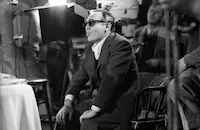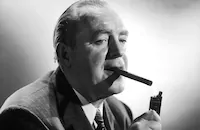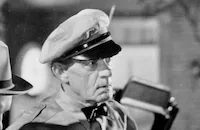Virtue

Brief Synopsis
Cast & Crew
Edward Buzzell
Carole Lombard
Pat O'brien
Ward Bond
Shirley Grey
Mayo Methot
Film Details
Technical Specs

Synopsis
Mae is sentenced by a New York City night court judge to serve ninety days at Welfare Island for solicitation, but her sentence is suspended by the judge, who thinks that such girls should be given another chance if they can return home. Instead of going home to Danbury, however, Mae leaves the train on which police officer Mackensie has placed her and takes a cab driven by Jimmy Doyle, a steadfast bachelor. Although she abandons the taxi without paying, Mae decides to go straight. Some time later, Jimmy is humiliated when Mae tries to repay him, but they eventually discover a mutual attraction. Believing her to be an unemployed stenographer, Jimmy helps Mae secure a cashier's job at Tony's, a small restaurant where Gert Hanlon, another former prositute, works as a waitress. Happily in love, Mae and Jimmy are married after a three-week romance. After honeymooning at Coney Island, they return to Mae's apartment, where Mackensie is waiting to arrest Mae. Although disappointed in his wife, Jimmy shows Mackensie their marriage license so she can remain free. The newlyweds agree to give their marriage a try and soon have saved $432 toward half-interest in a service station. Then Gert pleads with Mae for $200 for an operation, pledging to repay the loan. After taking the money from the bank, however, Mae learns from Jimmy's former roommate, Frank, that Gert has used a fake illness ruse before. Jimmy berates Frank for being such a sucker, while Mae is unable to tell Jimmy that she has also been conned. When Flanagan, the service station owner, wants to complete his deal with Jimmy early, Mae decides to retrieve the money. Mae searches for Gert until she chances to see her enter the apartment building where Lil, another former prostitute lives. When Mae slaps Gert, she agrees to repay the money the following night. Convinced that his wife is having an affair, Jimmy "borrows" another taxi and, without revealing his identity, drives Mae to Gert's the next evening, when it is revealed that Lil's callous boyfriend Toots is the person behind Gert's scheme. After Gert steals the money from Toots' wallet when he is not looking, he pushes her to the ground, which causes a fatal blow when her head hits the radiator. As Toots hides with the corpse in the bedroom, Mae enters. Thinking that the apartment is empty, she retrieves her $200 from the table and departs, leaving her purse and gloves behind. When Jimmy sees the silhouettes of Toots and Mae in the window, he thinks it is Mae and another man embracing. Later, Jimmy accuses Mae of reverting to her old tricks, and after he storms out, Mae is arrested for Gert's murder. Jimmy then goes on a three-day drinking binge, but sobers up when he see Mae's picture on the front page of the newspaper. After Mae refuses to see him, Jimmy goes to Lil's, where he recognizes Toots's silhouette against the glass bedroom door and realizes that he is the killer. Lil convinces Toots to stay calm and let Jimmy tell the district attorney, because she will provide him with an alibi. After tricking the two-timing Toots to go to the district attorney and refute Jimmy's statement, Lil reneges and Toots is arrested. At the service station, Jimmy apologizes to Flanagan before he realizes that Mae is at work, pumping gas. The couple is then reconciled and looks forward to a peaceful future together.

Director

Edward Buzzell
Cast

Carole Lombard

Pat O'brien

Ward Bond

Shirley Grey

Mayo Methot
Willard Robertson

Lew Kelly
Fred Santley
Arthur Wanzer
Jessie Arnold
Edwin Stanley

Jack La Rue
Ed Le Saint
Crew

Photo Collections
Videos
Movie Clip



Film Details
Technical Specs

Articles
Virtue - Virtue
Jimmy, who considers himself an expert on women, pegs Mae as an out-of-work stenographer, a misconception she doesn't correct, and soon the two are married. On their wedding night, however, the couple are confronted by Officer MacKenzie who prepares to arrest Mae until Jimmy produces the marriage license. Despite Jimmy's bitterness at being taken for a sucker, he doesn't annul the marriage and the couple try to make a go of it with Mae playing the happy homemaker. For a while the future looks bright with Jimmy about to close a deal with a partner on his own business - a gas station - but complications arise when Mae secretly borrows some of his savings to help Gert, a former friend, pay for an operation. Gert's emergency surgery turns out to be a hustler's scam and Mae desperately tries to get Jimmy's money back before he's the wiser, a situation that ends in a murder, imprisonment and a possible life sentence for Mae...unless someone comes forward with the real facts in the case.
An early Columbia programmer featuring rising stars Carole Lombard, on loanout from Paramount, and Pat O'Brien, prior to his emergence as one of Warner Bros.'s top stars, Virtue [1932] is a cliché-ridden, Pre-Code melodrama that is elevated by the spunkiness of its cast and some snappy, streetwise patter from scenarist Robert Riskin, who would soon pen some of Frank Capra's biggest hits (It Happened One Night [1934], Mr. Deeds Goes to Town [1936]). The title is ironic since virtue is that one unobtainable quality that eludes the movie's streetwalker heroine and the film's Pre-Code status is easy to determine by the happy ending which allows Mae to return to a normal married life without punishment for her previous unlawful behavior. Typical of the film's hardboiled dialogue is this bit of advice from Jimmy to his not-so-bright coworker Frank (Ward Bond) about women: "Let me give you a tip. Buy yourself a hot water bottle. It's just as warm as a wife and it's less trouble."
In the film's more lighthearted first half, Lombard reveals the excellent farceur she would soon become with her deadpan insults and crack comic timing; Pat O'Brien is equally appealing as Lombard's cynical but incurably romantic working class hubby and the two have an amiable, easy-going screen chemistry together. Virtue is also notable for supporting roles by the aforementioned Ward Bond (who would soon become a regular fixture in the films of director John Ford) and Mayo Methot as Lil, a madam with a weakness for no-good thugs, who comes to Mae's aid in the end (Methot would become Humphrey Bogart's first wife in 1938). The film is photographed by the great Joseph Walker (a four-time Oscar® nominee for such films as You Can't Take It with You [1938] and Only Angels Have Wings [1939]) and was an early effort for director Edward Buzzell, a former Broadway musical star, who would become best known for his work at MGM where he specialized in musicals (Honolulu [1939]) and comedies (At the Circus [1939]).
If anything, Virtue is more famous for its behind-the-scenes first meeting between Lombard and Harry Cohn, the foul-mouthed Columbia Studios mogul. "When Carole Lombard reported to his office for the first time," according to biographer Larry Swindell (in Screwball: The Life of Carole Lombard),"there were no polite preliminaries. He said, "Your hair's too white...you look like a whore." Carole shot back, "I'm sure you know what a whore looks like if anyone does." He was startled and captivated by her. He tried to soften his approach, but if the purple verbiage slipped out beyond his control, Carole replied in kind, and they waged a sort of card-stacking profanity contest. Harry Cohn decided that this here was one tough dame, but a looker, and he made a sensuous overture. Carole said, "Look, Mr. Cohn, I've agreed to be in your sh*tty little picture, but f*cking you is no part of the deal." According to fable, Harry Cohn straightened his trousers, cleared his throat, and said, "That doesn't mean you can't call me Harry." To his surprise and delight, he and Carole Lombard would always get along."
While filming Virtue, Lombard was surprised to discover that she had been given the largest dressing room on the Columbia lot and soon transformed it into a suite for entertaining old friends and film crew members during her brief stint at the studio. One of the more significant aspects of Virtue according to Swindell's biography of Lombard, "was its introduction of a new Lombard hairstyle, of her own creation. Topically called the Olympic bob in homage to the international games then under way in Los Angeles, it featured a cloud formation of loose curls covering most of her forehead. Previously her blond tresses had been distinctly parted and combed back and upward to reveal a high hairline and a shiny large forehead that conveyed ice glamour. Whether or not she was responding to Harry Cohn's advice for an unwhorelike appearance, the hair shading was darkened slightly for an ashen rather than platinum effect. Altogether she acquired a softer physiognomy more nearly realizing her own personality."
Virtue proved to be a hit with audiences and most of the reviews were positive without making claims that the film was anything more than an entertaining programmer. Typical of the critical response was this review in The New York Times: "The seasoned film-goer needs no diagram to follow the well-trodden path that "Virtue" takes once the ingredients for the formula have been introduced. But if the story is emotionally adolescent, the production has its merits. Pat O'Brien creates a fresh and believable character out of the cab driver....Carole Lombard brings her alabaster beauty and her talent for looking cruel and tender at the same time...The whole thing moves briskly and yesterday's audience seemed to like it."
Director: Edward Buzzell
Screenplay: Robert Riskin; Ethel Hill (story)
Cinematography: Joseph Walker
Music: Mischa Bakaleinikoff, David Klatzkin (both uncredited)
Film Editing: Maurice Wright
Cast: Carole Lombard (Mae), Pat O'Brien (Jimmy Doyle), Mayo Methot (Lil Blair), Jack La Rue (Toots O'Neil), Ward Bond (Frank), Willard Robertson (Detective MacKenzie), Shirley Grey (Gert Hanlon), Fred Santley (Hank), Arthur Wanzer (Flanagan), Jessie Arnold (Landlady), Edwin Stanley (District Attorney, uncredited).
BW-68m.
by Jeff Stafford
SOURCES:
Screwball: The Life of Carole Lombard by Larry Swindell (William Morrow and Co.)
The Films of Carole Lombard by Frederick W. Ott (The Citadel Press)
The New York Times
www.afi.com
IMDB

Virtue - Virtue
Quotes
Trivia
Notes
Film Daily incorrectly lists the running time as 87 min.














